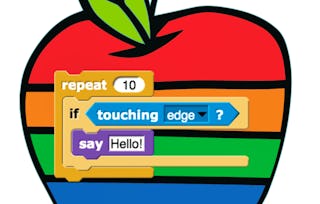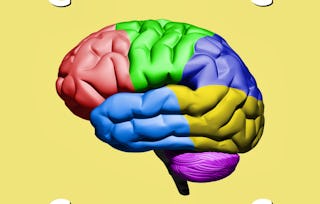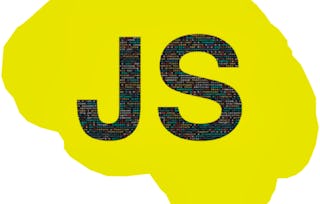Computational thinking is the process of approaching a problem in a systematic manner and creating and expressing a solution such that it can be carried out by a computer. But you don't need to be a computer scientist to think like a computer scientist! In fact, we encourage students from any field of study to take this course. Many quantitative and data-centric problems can be solved using computational thinking and an understanding of computational thinking will give you a foundation for solving problems that have real-world, social impact.

Computational Thinking for Problem Solving

Computational Thinking for Problem Solving

Instructor: Susan Davidson
131,914 already enrolled
Included with
1,430 reviews
Skills you'll gain
Details to know

Add to your LinkedIn profile
See how employees at top companies are mastering in-demand skills

There are 4 modules in this course
Computational thinking is an approach to solving problems using concepts and ideas from computer science, and expressing solutions to those problems so that they can be run on a computer. As computing becomes more and more prevalent in all aspects of modern society -- not just in software development and engineering, but in business, the humanities, and even everyday life -- understanding how to use computational thinking to solve real-world problems is a key skill in the 21st century. Computational thinking is built on four pillars: decomposition, pattern recognition, data representation and abstraction, and algorithms. This module introduces you to the four pillars of computational thinking and shows how they can be applied as part of the problem solving process.
What's included
6 videos1 reading5 assignments2 peer reviews4 discussion prompts
When we use computational thinking to solve a problem, what we’re really doing is developing an algorithm: a step-by-step series of instructions. Whether it’s a small task like scheduling meetings, or a large task like mapping the planet, the ability to develop and describe algorithms is crucial to the problem-solving process based on computational thinking. This module will introduce you to some common algorithms, as well as some general approaches to developing algorithms yourself. These approaches will be useful when you're looking not just for any answer to a problem, but the best answer. After completing this module, you will be able to evaluate an algorithm and analyze how its performance is affected by the size of the input so that you can choose the best algorithm for the problem you’re trying to solve.
What's included
7 videos6 assignments4 peer reviews
Computational thinking is a problem-solving process in which the last step is expressing the solution so that it can be executed on a computer. However, before we are able to write a program to implement an algorithm, we must understand what the computer is capable of doing -- in particular, how it executes instructions and how it uses data. This module describes the inner workings of a modern computer and its fundamental operations. Then it introduces you to a way of expressing algorithms known as pseudocode, which will help you implement your solution using a programming language.
What's included
6 videos5 assignments5 peer reviews
Writing a program is the last step of the computational thinking process. It’s the act of expressing an algorithm using a syntax that the computer can understand. This module introduces you to the Python programming language and its core features. Even if you have never written a program before -- or never even considered it -- after completing this module, you will be able to write simple Python programs that allow you to express your algorithms to a computer as part of a problem-solving process based on computational thinking.
What's included
9 videos13 readings12 assignments
Instructor

Offered by
Explore more from Algorithms
 Status: Preview
Status: PreviewUniversity of Michigan
 Status: Free Trial
Status: Free TrialUniversity of California San Diego
 Status: Free Trial
Status: Free TrialUniversity of Colorado System
 Status: Free Trial
Status: Free TrialUniversity of Glasgow
Why people choose Coursera for their career

Felipe M.

Jennifer J.

Larry W.

Chaitanya A.
Learner reviews
- 5 stars
80.41%
- 4 stars
13.21%
- 3 stars
3.35%
- 2 stars
1.25%
- 1 star
1.74%
Showing 3 of 1430
Reviewed on Feb 8, 2020
Great course - the non-programming parts (making flow charts etc) were actually more difficult than the programming (simple Python programming - my first time programming in python)
Reviewed on Dec 23, 2019
Really great course about Computational Thinking and how to solve problems. Recommended for anyone interested in learning more about Computer Science and how computers can help us solve problems.
Reviewed on Jan 17, 2019
Useful course taught at an adequate rate. I recommend it for people who are interested in learning the basics of computational thinking, i.e. a systematic approach to problem-solving.

Open new doors with Coursera Plus
Unlimited access to 10,000+ world-class courses, hands-on projects, and job-ready certificate programs - all included in your subscription
Advance your career with an online degree
Earn a degree from world-class universities - 100% online
Join over 3,400 global companies that choose Coursera for Business
Upskill your employees to excel in the digital economy
Frequently asked questions
No, definitely not! This course is intended for anyone who has an interest in approaching problems more systematically, developing more efficient solutions, and understanding how computers can be used in the problem solving process. No prior computer science or programming experience is required.
Some parts of the course assume familiarity with basic algebra, trigonometry, mathematical functions, exponents, and logarithms. If you don’t remember those concepts or never learned them, don’t worry! As long as you’re comfortable with multiplication, you should still be able to follow along. For everything else, we’ll provide links to references that you can use as a refresher or as supplemental material.
This course will help you discover whether you have an aptitude for computational thinking and give you some beginner-level experience with online learning. In this course you will learn several introductory concepts from MCIT instructors produced by the same team that brought the MCIT degree online.
If you have a bachelor's degree and are interested in learning more about computational thinking, we encourage you to apply to MCIT On-campus (http://www.cis.upenn.edu/prospective-students/graduate/mcit.php) or MCIT Online (https://www.coursera.org/degrees/mcit-penn). Please mention that you have completed this course in the application.
More questions
Financial aid available,
¹ Some assignments in this course are AI-graded. For these assignments, your data will be used in accordance with Coursera's Privacy Notice.

